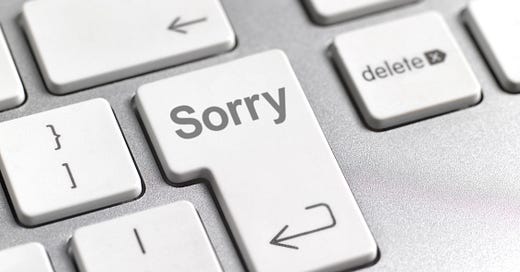The Power of an Apology
Admitting we were wrong can have miraculous effects
In 1970 a movie came out called “Love Story,” and it sort of took the country by storm. The line from its poster that became a kind of buzz phrase for an entire era was “Love means never having to say you’re sorry.”
Wow, what bullshit that is.
Working with individuals and couples (not to mention experiencing my own life), I’ve seen how one of the biggest barriers to love in relationships is when we’re tempted to be overly casual about them. “It’s okay that I was a sort of disrespectful with that comment; you know I love you.” “It’s okay that I didn’t acknowledge your birthday; you know I care.” Uh, no. The people we’re closest to should earn our most conscious efforts at the display of love and respect, not our least. And that should include saying “I’m sorry” when we fail to show either one.
Atonement is when you admit in your heart that you got something wrong; an amends is when you admit it to the other person, someone towards whom you’ve transgressed. And it’s not enough to apologize, either. An apology isn’t a get-out-of-jail-free card. It’s a way of creating space for a new beginning, earning a chance to prove that we learned a lesson and are capable of behaving differently.
In intimate relationships, the point is not just to relax and assume it doesn’t really matter so much what we do now because, after all, we’re committed.
Years ago, I was giving a talk at a conference in New Delhi, India, and the actress Nicole Kidman was giving a talk there as well. At one point during the conference I was standing at the hotel’s concierge desk when a huge bouquet of flowers was delivered and I heard a man behind the desk say to his colleague, “These flowers are from Mr. Urban for Ms. Kidman.”
A year or so after that, I read an interview with Keith Urban talking about his marriage to Nicole (I don’t know either of them personally, by the way) and he said something along the line of, “I’ve been married to her for years, and I treat her every day like I’m still trying to get her to date me.”
I remembered the flowers, so I knew it was true. Love isn’t something that happens, then you’re all set. Love is something that happens, then every day you have to work it. Like anything else of value, it has to be tended to, cultivated, and taken care of.
But a head of lettuce isn’t going to be personally offended if I forget to water my vegetable garden one day, while a human being might be. Love isn’t where we’re no longer fragile; it’s where we’re more fragile than anywhere else. And therein lies its healing power as well as the risk to our emotions. If I let you into my heart, then I’m giving you the power to hurt me. I agree with E. Lockhart that “Love is when you give someone else the power to destroy you, and you trust them not to do it.” Holding a person’s heart in our hands is a huge responsibility that many people don’t take seriously enough.
So none of us is perfect, we all make mistakes, and all of us get triggered at times by the wounds that love can often bring to the surface. Love is where your wounds meet my wounds, and we both have the chance to grow because of it. We can wound each other by constantly triggering those wounds, or heal each other by forgiving them. And compassion is the only real healer. Life can be hard for all of us, and everyone else is as sensitive as we are. But when we do misstep, when we say this or that which we know reflects not our highest self but our character defect, our willingness to apologize, to make the effort to be better next time, is like medicine on the soul of a relationship.
It’s so much easier to forgive someone when they’re had the courtesy to apologize. It’s so much easier to to trust someone when they have the strength of character to try to improve. It’s so much easier to love someone when you know your relationship is a journey of healing, not a place where we can ignore our wounds but where we’re facing them together.
Every day we can try to get it right in love, yet every day there’s the possibility we’ll fail. When we do, as long as we acknowledge the mistake and seek to make amends, the love will not be less because of it. In a way it will be more.





Ah, Marianne, you hit the bulls eye with this refrain! In our digital social world of madness, our egos often get the best of us!
We are forgetting to be contemplative with our interpersonal and professional remarks--allowing what are essentially good manners be cast aside to a point of harm. So, once again, your counsel on being more disciplined with our thoughts is relevant since they have the power to either heal or destroy loving relationships.
Thank you very much for writing this piece today! And as you rightfully keep saying, we need to "step-it-up!"--being more attentive with our words and work for the common good.
That is going to take several thoughtful times to read. Very powerful not just in these trying times but in all the times we are wondering around the world in our usual semiconscious state trying to cope with life during this age of Aquarius